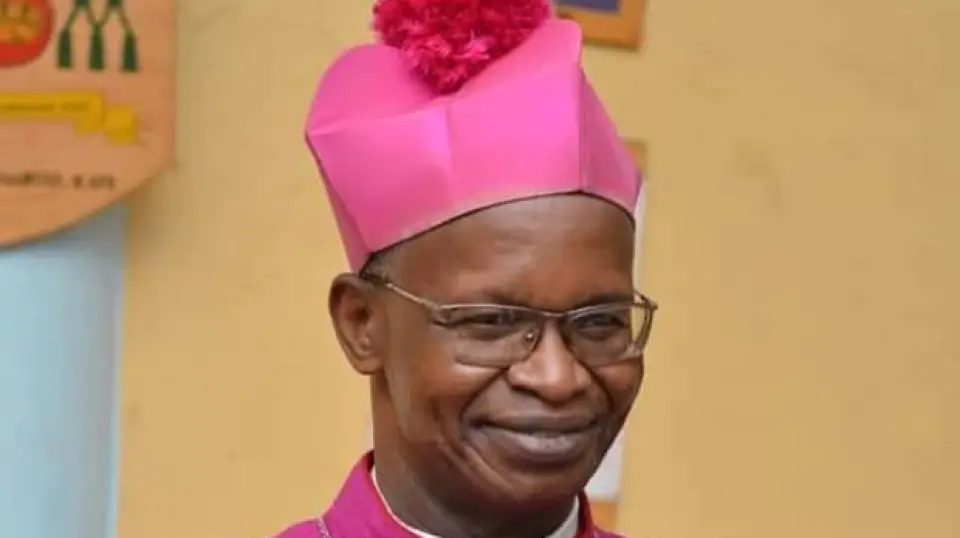Aware that Africa today is a great leader in the universal Church, he hopes to help fulfill the prophecy of Pope Benedict XVI who spoke of this continent as one of the spiritual lungs of the world.
In the space of a few weeks, Bishop Richard Kuuia Baawobr has taken on new importance. First, on May 29, when Pope Francis unveiled the list of new cardinals he wanted to create, this bishop of the diocese of Wa, Ghana, was one of them. When he was told the news at the end of a Mass, the Ghanaian bishop thought it was a joke. “It’s a joke, it’s not serious… Cardinals are normally appointed from among the archbishops,” he told Vatican News, still stunned by the Argentinean pope’s “surprise.”
Two months passed and a new responsibility fell on the shoulders of this 63-year-old pastor who in 2010 was the first African elected to head the Missionaries of Africa (White Fathers), a society founded at the end of the 19th century by French Cardinal Charles Lavigerie. Meeting in Ghana, his African brother bishops chose him as president of the Symposium of Episcopal Conferences of Africa and Madagascar (SECAM). This is a first for a Ghanaian since the institution was established in 1969.
At the head of this body, he facilitates coordination and dialogue between all African episcopates. This is a delicate task on this continent, with its large regional episcopal conferences.
The sudden public prominence of this man of the Church does not seem to have made him lose the course of his vocation: “Whether it is as a cardinal or as president of SECAM, I see it as a call to serve. To serve the Church, to serve my brothers and sisters, and to be available,” he said when commenting on his election at the end of July.
Aware that Africa today is a great leader in the universal Church, he hopes to help fulfill the prophecy of Pope Benedict XVI who spoke of this continent as one of the spiritual lungs of the world.
A White Father who passed through Europe
Born in Ghana on June 21, 1959, Richard Kuuia Baawobr joined the White Fathers in 1981 after studying philosophy at the Saint Victor Seminary in Tamale. From 1981 to 1982, he was in Fribourg, Switzerland, for his novitiate. Then, from 1982 to 1987, he completed his theological studies at the Missionary Institute in London. It was in the British capital that he made his religious vows before being ordained a year later, on July 18, 1987.
After ministering at a parish in the Democratic Republic of Congo, the priest left for Rome to study exegesis at the Pontifical Biblical Institute in Rome. Then he crossed the Alps to Lyon to study Ignatian spirituality at the Jesuit spiritual center of Le Châtelard. There he obtained a degree in Sacred Scripture and a doctorate in biblical theology.
After spending some time ministering in Tanzania, he became the director of the formation house of the White Fathers in Toulouse from 1999 to 2004. An anecdote from 2004 shows that the then-40-year-old is not without a sense of humor. “The candidates of the Lavigerie Fraternity (Toulouse) teased me by asking me where they should put my photo if I was elected Superior General. I told them, ‘You can put it in the bathroom, I’m sure you’ll see me there every day!’” he recounted with amusement a few years later.
A cardinal 140 years after Charles Lavigerie’s elevation to the purple
That same year, he became the first Assistant General of the Missionaries of Africa. During his mandate, he survived a deep vein thrombosis. In 2010, he was elected Superior General of the Missionaries of Africa, a position he held until 2016: a first for an African. In this position, he explained that he had become aware that their mission was no longer limited to Africa, but also extended to Europe, the Americas, and Asia. He realized the importance of the “deterritorialization of the mission.”
He was also chosen by the Union of Superiors General to participate in the Synod on the Family in October 2015.
In 2016, this specialist in Islam—he was vice-grand chancellor of the PISAI (Pontifical Institute for Arab-Islamic Studies)—was appointed bishop of Wa, Ghana. Pope Francis also appointed him a member and consultor of the Pontifical Council for Promoting Christian Unity in July 2020.
As bishop of Wa, he launched an effort to meet the needs of those suffering with mental illness in his diocese. Parishes, church organizations, lay people and religious began bringing food, clothing, and medicine to people on the streets who struggle with mental illness.
On August 27, when he receives the cardinal’s biretta from Pope Francis, Bishop Richard Kuuia Baawobr may have a thought for the founder of the White Fathers, Charles Lavigerie, who 140 years earlier received the cardinal’s purple from Leo XIII on March 28, 1882.
